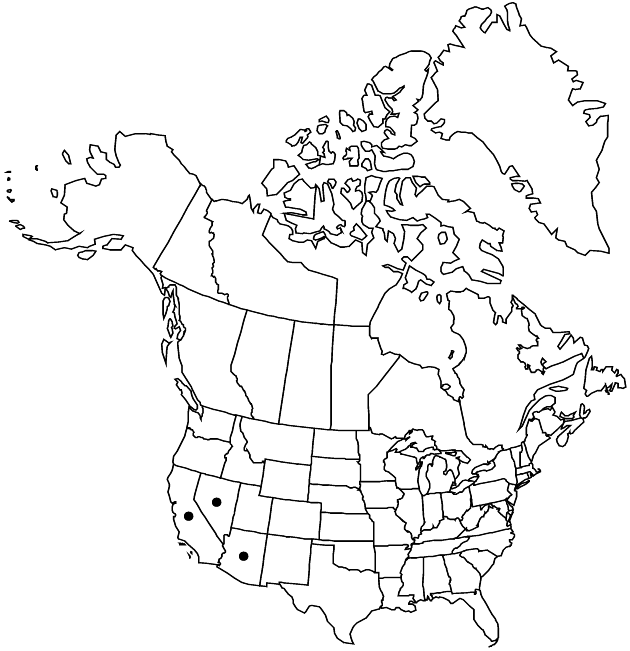Difference between revisions of "Ericameria teretifolia"
Man. Fl. Pl. Calif., 1024. 1925.
FNA>Volume Importer |
imported>Volume Importer |
||
| (5 intermediate revisions by 2 users not shown) | |||
| Line 8: | Line 8: | ||
}} | }} | ||
|common_names=Green or round-leaf rabbitbrush | |common_names=Green or round-leaf rabbitbrush | ||
| − | |basionyms={{Treatment/ID/ | + | |special_status={{Treatment/ID/Special_status |
| + | |code=E | ||
| + | |label=Endemic | ||
| + | }} | ||
| + | |basionyms={{Treatment/ID/Basionym | ||
|name=Linosyris teretifolia | |name=Linosyris teretifolia | ||
|authority=Durand & Hilgard | |authority=Durand & Hilgard | ||
| + | |rank=species | ||
| + | |publication_title=Pl. Heermann., | ||
| + | |publication_place=41. 1854 | ||
}} | }} | ||
|synonyms={{Treatment/ID/Synonym | |synonyms={{Treatment/ID/Synonym | ||
|name=Chrysothamnus teretifolius | |name=Chrysothamnus teretifolius | ||
|authority=(Durand & Hilgard) H. M. Hall | |authority=(Durand & Hilgard) H. M. Hall | ||
| + | |rank=species | ||
}} | }} | ||
|hierarchy=Asteraceae;Asteraceae tribe Astereae;Ericameria;Ericameria teretifolia | |hierarchy=Asteraceae;Asteraceae tribe Astereae;Ericameria;Ericameria teretifolia | ||
| Line 38: | Line 46: | ||
-->{{#Taxon: | -->{{#Taxon: | ||
name=Ericameria teretifolia | name=Ericameria teretifolia | ||
| − | |||
|authority=(Durand & Hilgard) Jepson | |authority=(Durand & Hilgard) Jepson | ||
|rank=species | |rank=species | ||
| Line 52: | Line 59: | ||
|publication title=Man. Fl. Pl. Calif., | |publication title=Man. Fl. Pl. Calif., | ||
|publication year=1925 | |publication year=1925 | ||
| − | |special status= | + | |special status=Endemic |
| − | |source xml=https:// | + | |source xml=https://bitbucket.org/aafc-mbb/fna-data-curation/src/2e0870ddd59836b60bcf96646a41e87ea5a5943a/coarse_grained_fna_xml/V19-20-21/V20_146.xml |
|tribe=Asteraceae tribe Astereae | |tribe=Asteraceae tribe Astereae | ||
|genus=Ericameria | |genus=Ericameria | ||
Latest revision as of 20:00, 5 November 2020
Plants 30–150 cm. Stems erect to ascending, green when young, fastigiately branched, gland-dotted (in pits), resinous. Leaves mostly ascending to spreading; blades filiform (adaxially sulcate), 10–35 × 0.5–1.5 mm, midnerves obscure, apices acute to obtuse or rounded, faces glabrous, gland-dotted (in circular, deep pits), resinous. Heads in cymiform to racemiform arrays (1–3 cm wide). Peduncles 0.5–2 mm (bracts 0–3, mostly like outer phyllaries). Involucres obconic, 5–9 × 2–5 mm. Phyllaries 16–20 in 3–5 series (in vertical ranks), tan, lanceolate to oblong, 1–7 × 0.5–1.5 mm, strongly unequal, mostly chartaceous, midnerves mostly obscure, apices acute to rounded (outer each tipped with subspheric resin-gland), abaxial faces resinous. Ray florets 0. Disc florets 5–7; corollas 5.8–8 mm. Cypselae tan to brown, narrowly ellipsoid, 3–4 mm, sericeous; pappi off-white to brown, 6–7.5 mm. 2n = 18.
Phenology: Flowering fall.
Habitat: Canyon walls, rocky flats, and slopes
Elevation: 600–2400 m
Distribution

Ariz., Calif., Nev.
Discussion
Selected References
None.